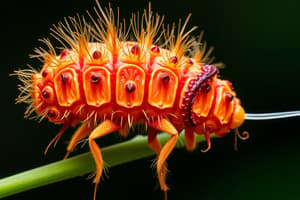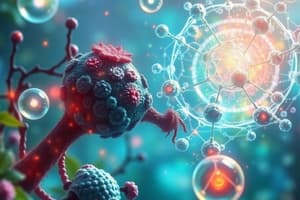Podcast
Questions and Answers
Which branch of biology is primarily concerned with the study of the processes by which populations of organisms change over time?
Which branch of biology is primarily concerned with the study of the processes by which populations of organisms change over time?
- Genetics
- Evolutionary Biology (correct)
- Physiology
- Ecology
What is the defining characteristic that distinguishes living organisms from non-living matter according to Cell Theory?
What is the defining characteristic that distinguishes living organisms from non-living matter according to Cell Theory?
- Being composed of cells (correct)
- The capacity to evolve over time
- The ability to perform chemical reactions
- The presence of a stable internal environment
Which of the following biological processes directly maintains a stable internal environment in an organism, despite external changes?
Which of the following biological processes directly maintains a stable internal environment in an organism, despite external changes?
- Adaptation
- Metabolism
- Heredity
- Homeostasis (correct)
The study of the structure and function of cells is a core focus in which of these disciplines?
The study of the structure and function of cells is a core focus in which of these disciplines?
Which biological process involves the sum of all chemical reactions, including both the breakdown and synthesis of molecules, within a living organism?
Which biological process involves the sum of all chemical reactions, including both the breakdown and synthesis of molecules, within a living organism?
What is the primary function of genes in the context of heredity?
What is the primary function of genes in the context of heredity?
Which aspect of biology would be most concerned with examining the interactions between different species in a given ecosystem?
Which aspect of biology would be most concerned with examining the interactions between different species in a given ecosystem?
The ability of an organism to develop characteristics that aid survival and reproduction is an example of?
The ability of an organism to develop characteristics that aid survival and reproduction is an example of?
Which level of biological organization directly involves interactions among different species within a shared environment?
Which level of biological organization directly involves interactions among different species within a shared environment?
What is the correct order of biological organization from the simplest to the most complex?
What is the correct order of biological organization from the simplest to the most complex?
In the scientific method, which step involves assessing potential errors and limitations?
In the scientific method, which step involves assessing potential errors and limitations?
Which component of an ecosystem does NOT include living organisms?
Which component of an ecosystem does NOT include living organisms?
What is the primary function of an organ system within an organism?
What is the primary function of an organ system within an organism?
Flashcards
Biosphere
Biosphere
The global sum of all ecosystems. Think of it as the entire Earth and all living things interacting.
Ecosystem
Ecosystem
A community of living things (biotic) and their non-living environment (abiotic) working together. Examples are a forest, a lake, or a coral reef.
Community
Community
A group of different species living in the same area and interacting with each other.
Population
Population
Signup and view all the flashcards
Scientific Method
Scientific Method
Signup and view all the flashcards
What is Biology?
What is Biology?
Signup and view all the flashcards
What is Botany?
What is Botany?
Signup and view all the flashcards
What is Zoology?
What is Zoology?
Signup and view all the flashcards
What is Microbiology?
What is Microbiology?
Signup and view all the flashcards
What is Ecology?
What is Ecology?
Signup and view all the flashcards
What is Evolution?
What is Evolution?
Signup and view all the flashcards
What is Homeostasis?
What is Homeostasis?
Signup and view all the flashcards
What is Metabolism?
What is Metabolism?
Signup and view all the flashcards
Study Notes
Introduction to Biology
- Biology is the scientific study of life and living organisms.
- It encompasses a broad range of topics, including the structure, function, growth, origin, evolution, and distribution of living things.
- Key aspects of biology include classifying organisms, understanding their interactions with each other and their environment, and studying evolutionary relationships.
Branches of Biology
- Botany: The study of plants, including their structure, function, classification, genetics, and evolution.
- Zoology: The study of animals, including their structure, function, classification, behavior, and evolution.
- Microbiology: The study of microorganisms, such as bacteria, viruses, fungi, and protists.
- Ecology: The study of the interactions between organisms and their environment.
- Genetics: The study of heredity and the variation of inherited characteristics.
- Physiology: The study of the functions of living organisms and their parts, including organs, tissues, and cells.
- Molecular Biology: The study of biological molecules, such as proteins and nucleic acids, and their role in biological processes.
- Cell Biology: The study of the structure and function of cells.
Fundamental Concepts in Biology
- Cell Theory: All living things are composed of cells, and all cells arise from pre-existing cells. Cells are the basic structural and functional units of life.
- Evolution: The process by which populations of organisms change over time. This change is driven by mechanisms such as natural selection and genetic drift. Evolution results in biodiversity and adaptation to different environments.
- Homeostasis: The ability of an organism to maintain a stable internal environment, even when the external environment changes. Examples include maintaining body temperature and blood pH. Organisms use various mechanisms for homeostasis.
- Metabolism: The sum of all chemical reactions that occur within an organism. These reactions involve breaking down and building up molecules, and provide the energy for life processes.
- Heredity: The transmission of traits from parents to offspring through genes. Genes are sequences of DNA that encode instructions for building and maintaining an organism.
- Adaptation: A characteristic that enhances an organism's survival and reproduction in a particular environment. Adaptations can be structural, behavioral, or physiological.
Levels of Biological Organization
- Biosphere: The global sum of all ecosystems.
- Ecosystem: A community (biotic components) and its physical environment (abiotic components). These components interact through nutrient cycles and energy flows.
- Community: All the populations of different species living in a particular area. These species interact with each other and with the physical environment.
- Population: A group of individuals of the same species living and interacting in a given area.
- Organism: An individual living thing.
- Organ system: A group of organs working together to perform a specific function.
- Organ: A structure composed of different tissues working together to perform a specific function.
- Tissue: A group of similar cells working together to perform a specific function.
- Cell: The basic unit of life.
- Molecule: A group of atoms bonded together.
- Atom: The basic building block of matter.
The Scientific Method
- A systematic approach to understanding the natural world.
- Steps involved in the scientific method include observation, forming a hypothesis, designing experiments, collecting data, analyzing results, and drawing conclusions. Errors and limitations are important factors to consider at each stage.
Studying That Suits You
Use AI to generate personalized quizzes and flashcards to suit your learning preferences.




